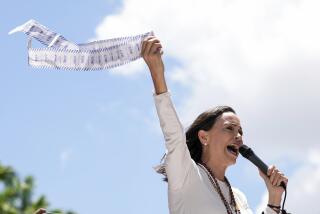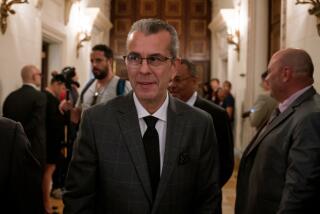Sandinistas Conclude They Lost Touch With Populace
MANAGUA, Nicaragua — Three hours after the polls closed last Sunday, a Sandinista pollster at party headquarters handed Nicaraguan President Daniel Ortega returns from a carefully chosen sample of 55,000 voters that showed him losing the battle for reelection.
Ortega was incredulous. Isn’t the trend reversible? he asked.
No, said the pollster, whose pre-election surveys had forecast a Sandinista landslide.
“Wait, there are still more than a million votes to count,” insisted Dionisio Marenco, the campaign chief. Huge speakers blared reggae music outside to Sandinista faithful who were waiting for official returns and a midnight celebration.
It was not until after 1 a.m. that Ortega privately admitted his loss, not until 6 a.m. that he conceded to the nation.
The slow, painful dawning of that never-imagined defeat underscored the degree to which the Sandinista National Liberation Front had lost touch with the country it ruled for a decade. In post-election interviews, Sandinista leaders admit they were deceived by their own polls, their own rhetoric and the huge crowds they turned out to their rallies.
“In 10 years, the front adopted the psychology of a party in power,” Marenco said. “We were drunk with this idea that everything was OK. . . . We lost our capacity to converse, to listen, to criticize ourselves, the capacity to measure, and the people punished us for that.”
Still in shock from the returns, which gave Violeta Barrios de Chamorro and her National Opposition Union (UNO) 55% of the vote, some Sandinista officials admit with unusual candor that it’s time to reshape their revolutionary movement as a democratic party.
The Sandinista Front forged its identity in combat, ousting the Somoza dictatorship in a guerrilla war and later building a large army to fight the U.S.-backed Contras. Its full-fledged militants number about 40,000 and respond to a national directorate of nine comandantes.
Some Sandinistas believe this elitist and undemocratic command structure, based on the need for military self-defense, removed the party from political reality and contributed to its electoral defeat.
“We were a guerrilla army,” said one high-ranking party official. “We had little time to talk about how to run the country. Everything was war. This army entered a political competition, and we weren’t totally prepared.”
“Within Sandinismo , we militants became almost a sect. We didn’t open up to outsiders,” said Daniel Nunez, whose resume reflects the concentration of power. He heads the Sandinista farmers union and belongs to the lawmaking National Assembly and the party’s 102-member Sandinista Assembly.
A sign of the leadership’s isolation appeared last Tuesday, when the Sandinista Assembly met in an air-conditioned auditorium to analyze the election while thousands of bitter supporters gathered outside. When the session ended, Ortega came out to speak, but most of the other leaders slipped out a back door and drove away in their cars.
In an interview two days before the vote, Ortega acknowledged that some members of his government had become “too bureaucratic.” But he insisted that his own style of leadership and politicking put him in “permanent conversation with all sectors of the population.” Defeat, he said, was “inconceivable.”
The Ortega campaign portrayed revolutionary Nicaragua as different from the rest of Latin America, where incumbents are routinely turned out by voters protesting economic hard times.
Nicaragua’s economic devastation was the fault of the Contras, not the Sandinistas, Ortega insisted, and his real opponent was George Bush. Young voters who came of age during the revolution were behind him, he said. Sandinista polls proved it. So did the huge crowds delivered to glitzy Sandinista rallies in state-owned trucks.
Sandinista officials now admit all these assumptions were wrong.
They said they failed to understand the depth of opposition to compulsory military service, which turned the youth vote to Chamorro after she pledged to abolish the draft. Her coalition won in some Managua neighborhoods heavily populated by army personnel.
One presidential aide said the Sandinistas learned too late that some of the 200,000 to 300,000 people who attended their final rally Feb. 21 had come expecting Ortega to announce an end to the draft and left disappointed. He said Ortega weighed such a move but never acted.
“The military service helped us win the war, but it helped UNO win the election,” Nunez said.
By massively outspending UNO, distributing thousands of “Daniel for President” T-shirts and caps and plastering his image on billboards across the country, the Sandinistas might have alienated poor voters who viewed the campaign as a waste of money.
“It was a serious mistake for the Sandinistas to overwhelm people with propaganda,” said Xabier Gorostiaga, a political analyst close to the Sandinistas. “It created a feeling of arrogance. This country doesn’t ever accept arrogance.”
The Sandinistas said they were also misled by independent opinion polls that echoed their own private surveys. At least three outside polls taken in the last month of the campaign showed Ortega winning by 16 to 24 percentage points.
All the polls agreed that hard-core Sandinistas made up about 40% of the electorate, but most erred in calculating which way the large bloc of voters who called themselves undecided was leaning.
Marvin Ortega, who conducted surveys for the Nicaraguan firm Itztani, said he and other pollsters underestimated how much fear the Sandinistas had instilled among Nicaraguans. He said many voters thought his pollsters were Sandinistas and mouthed support for Ortega, then voted against him.
“The people were tired of repression and attempts to control their lives,” Marvin Ortega said. “I don’t believe they voted with their stomachs. They are politically proud. They voted with the desire to express an opinion.”
At the start of the revolution, the Sandinistas pushed Nicaraguans to join neighborhood defense committees, agricultural cooperatives and the Sandinista militia. They imposed price controls on farmers and forced them to sell their crops to the state.
The government reversed most of these unpopular policies. But resentment lingered, and the party continued to make mistakes, such as assigning officials to govern regions they knew little about. “They didn’t know the idiosyncrasies of the area, and they would try to impose their ideas,” Nunez said.
Sandinista loyalists have spent much of their time since last Sunday in meetings to analyze the election, maintain party morale and reform its structures. In a speech Tuesday, Ortega reminded thousands of loyalists that the front remains “the biggest, most solid and most organized party in the country” and vowed to “continue governing from below.”
Defeat is also forcing Sandinista leaders to re-examine what their party stands for.
“We now have to ask what the revolution was,” said Marenco. “We said we represented the people, but the people voted against us.”
Some Sandinistas say they are willing to help arrange a smooth transfer of power to Chamorro’s 14-party coalition. Ortega has already named a transition team to negotiate with her representatives.
Other party loyalists are adopting a militant opposition stance. They speak of setting up offices to help farmers defend their land in the event that UNO tries to return it to former owners who saw their property confiscated by the Sandinistas. Sandinista labor leaders are demanding emergency wage hikes when Chamorro takes office and threatening to cripple her government with strikes.
“The Sandinista Front originated as a democratic centralist party, with some very undemocratic elements,” said Robert Pastor, an adviser on Latin American affairs under former President Jimmy Carter and the chief of Carter’s observer team here. “It has been transformed somewhat during this election campaign but not totally. The Sandinistas can make the country ungovernable if they want to, or they could be a constructive opposition.”
It is not clear which leaders will rise and which will fall in the party’s internal restructuring. Ortega staked his personal prestige on winning the election but has shown no sign of retreating from an active party role.
As a losing presidential candidate, Ortega is entitled by law to a seat in the 91-member National Assembly. Whether or not he takes it, Carlos Nunez, the current assembly president, who was reelected to that body, will play a visible role in the Sandinista minority bloc.
Defense Minister Humberto Ortega, the president’s brother, and Interior Minister Tomas Borge, the sole surviving founder of the Sandinista Front, are expected to lose their posts as Chamorro tries to take control of the armed forces now under their command.
Also unclear is how many militants will stay active when they lose their access to powers and privileges afforded by the state.
Marenco said the Sandinistas must go into each neighborhood asking who voted against them, why and what the party must do to regain their support. “It is the work of evangelical pastors. House to house.”
Nicaraguans in Los Angeles pledged to put aside their differences. B1
More to Read
Sign up for Essential California
The most important California stories and recommendations in your inbox every morning.
You may occasionally receive promotional content from the Los Angeles Times.










